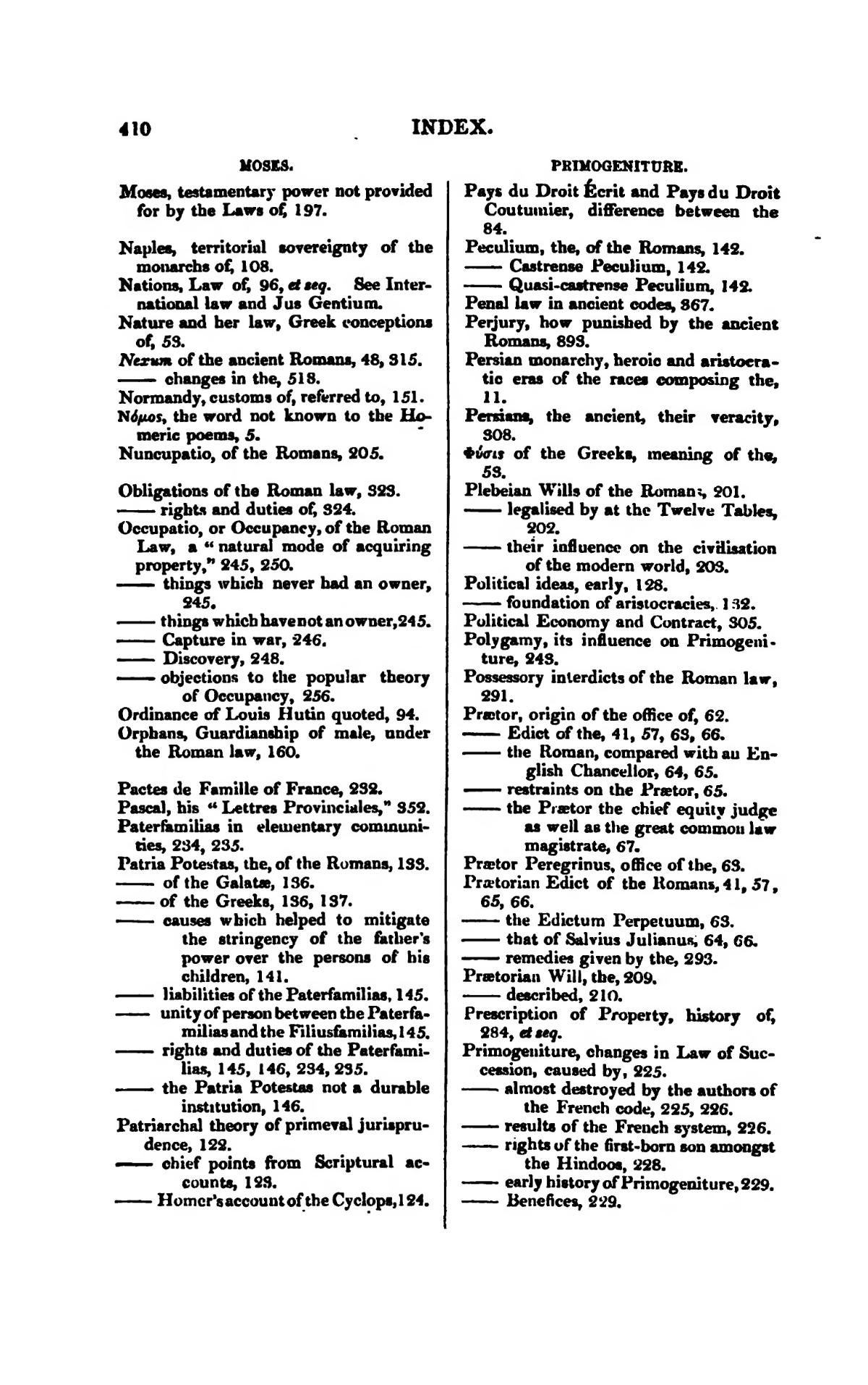Moses, testamentary power not provided for by the Laws of, 197.
Naples, territorial sovereignty of the monarchs of, 108.
Nations, Law of, 96, et seq. See International law and Jus Gentium.
Nature and her law, Greek conceptions of, 53.
Nexum, of the ancient Romans, 48, 315.
changes in the, 518.
Normandy, customs of, referred to, 151.
Νόμος, the word not known to the Homeric poems, 5.
Nuncupatio, of the Romans, 205.
Obligations of the Roman law, 323.
rights and duties of, 324.
Occupatio, or Occupancy, of the Roman Law, a "natural mode of acquiring property," 245, 250
things which never had an owner, 245.
things which have not an owner, 245.
Capture in war, 246.
Discovery, 248.
objections to the popular theory of Occupancy, 256.
Ordinance of Louis Hutin quoted, 94.
Orphans, Guardianship of male, under the Roman law, 160.
Pactes de Famille of France, 232.
Pascal, his "Lettres Provinciales," 352.
Paterfamilias in elementary communities, 234, 235.
Patria Potestas, the, of the Romans, 133.
of the Galatæ, 136.
of the Greeks, 136, 137.
causes which helped to mitigate the stringency of the father's power over the persons of his children, 141.
liabilities of the Paterfamilias, 145.
unity of person between the Paterfamilias and the Filiusfamilias, 145.
rights and duties of the Paterfamilias, 145, 146, 234, 235.
the Patria Potestas not a durable institution, 146.
Patriarchal theory of primeval jurisprudence, 122.
chief points from Scriptural accounts, 123.
Homer's account of the Cyclops, 124.
Pays du Droit Écrit and Pays du Droit Coutumier, difference between the 84.
Peculium, the, of the Romans, 142.
Castrense Peculium, 142.
Quasi-castrense Peculium, 142.
Penal law in ancient codes, 367.
Perjury, how punished by the ancient Romans, 893.
Persian monarchy, heroic and aristocratic eras of the races composing the, 11.
Persians, the ancient, their veracity, 308.
Φύσις of the Greeks, meaning of the, 53.
Plebeian Wills of the Romans, 201.
legalised by at the Twelve Tables, 202.
their influence on the civilisation of the modern world, 203.
Political ideas, early, 128.
foundation of aristocracies, 132.
Political Economy and Contract, 305.
Polygamy, its influence on Primogeniture, 243.
Possessory interdicts of the Roman law, 291.
Prætor, origin of the office of, 62.
Edict of the, 41, 57, 63, 66.
the Roman, compared with an English Chancellor, 64, 65.
restraints on the Prætor, 65.
the Prætor the chief equity judge as well as the great common law magistrate, 67.
Prætor Peregrinus, office of the, 63.
Prætorian Edict of the Romans, 41, 57, 65, 66.
the Edictum Perpetuum, 63.
that of Salvius Julianus, 64, 66.
remedies given by the, 293.
Prætorian Will, the, 209.
described, 210.
Prescription of Property, history of, 284, et seq.
Primogeniture, changes in Law of Succession, caused by, 225.
almost destroyed by the authors of the French code, 225, 226.
results of the French system, 226.
rights of the first-born son amongst the Hindoos, 228.
early history of Primogeniture, 229.
Benefices, 229.
